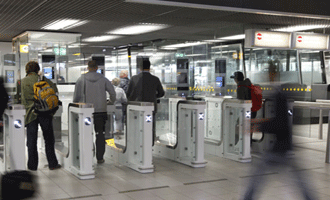The majority of citizens surveyed by Accenture in six countries (89 percent) say they are willing to share their biometric details – the unique physical characteristics, such as fingerprints, that can be used to verify identities and automate recognition – when traveling across international borders.
However, most (69 percent) of the 3,000 survey respondents say they have not shared any biometric information to date.

Survey respondents – from Australia, France, Germany, Japan, the United Kingdom and the United States – believe biometrics can play a significant role in facilitating faster and more secure travel while protecting borders.
When asked about the specific benefits of sharing biometrics more than half (62 percent) of those surveyed are willing to share biometric information to make their country’s borders more secure, speed up customs and border control processing (58 percent) and make travel more convenient (56 percent).

“The survey findings show strong support from citizens for the greater use of biometrics to secure national borders, enable more convenient travel and facilitate faster processing through customs and border control,” said Mark Crego who leads Accenture’s global Border and Identity Services business. “The majority of citizens are willing to share biometric details to help increase border security and, at the same time, reap benefits such as faster processing times at borders and more convenient travel.”
Smart Borders
More than half (58 percent) of those surveyed said they would be likely to share their biometric details to enable participation in Registered Traveler Programs (RTP’s) that allow pre-registered passengers to have faster, easier processing through customs and border control.
The survey also found nearly three-fourths (71 percent) of citizens support the use of biometrics to verify the identities of all persons crossing borders (citizens and visitors) and a similar number (73 percent) believe that using biometrics to verify the identity of everyone crossing the border would make countries more secure.
Crego added: “The strong support by citizens for technologies that can improve travel and secure borders demonstrates how important it is for border management agencies to continue adopting new tools that meet the demands of citizens and better manage the transit of people across borders. Increasing the use of biometrics and introducing registered traveler programs can make traveling faster, safer and more convenient and strengthen both border and national security through improved intelligence gathering.”
Automated Border Clearance (e-gates)
When asked about the use of automated border clearance solutions, such as e-gates at airports and border crossings, less than one-fourth (23 percent) of respondents said they had used an e-gate in the past. However, of those who have used an e-gate, the majority (80 percent) said they would do so again if they had the option, and 85 percent of e-gate users found them faster than manual border clearance checkpoints managed by a border patrol officer.
Despite citizens’ support for biometrics and the greater use of technology to facilitate travel, more than two-thirds of respondents (68 percent) said that prior to deciding to share their biometric information, they would want to know what security measures were in place to protect the data, and 67 percent would want to know how their personal information is being used.
U.S. Findings
The large majority of U.S. citizens surveyed (87 percent) are willing to share biometric details with border agencies to facilitate travel. However, only 19 percent say they have shared any biometric information to date. Additionally:
- U.S. respondents are very receptive to using biometrics as a means of improving overall border security: 65 percent say they would be likely to share biometrics if it meant making the country’s borders more secure.
- More than half (61 percent) say they would be likely to share their biometrics to secure faster processing through customs and border control and 59 percent would be willing to achieve more convenient travel.
- Only 15 percent say they have used an e-gate at an airport but 54 percent say, they would use an e-gate, if given an option.
- Nearly two-thirds (64 percent) say they are likely to participate in a registered travel program, even if that required submitting biometric information to participate.
Country Comparisons
- Nearly one-fourth of respondents from Germany (23 percent) say they have shared biometric details with third parties, the highest percentage of respondents in all six countries surveyed. By contrast, only 17 percent of Japanese and U.K. respondents say they have shared biometric information in the past.
- The majority of those surveyed in France (66 percent), Australia (65 percent), the United States (64 percent) and the United Kingdom (64 percent) say they are likely to participate in a registered travel program, even if it required them to submit biometric information to participate. This contrasts with Germany and Japan, where less than half (44 percent in Germany and 49 percent in Japan) of respondents said they would partake in a similar registered travel program.
- U.K. citizens are the most receptive to using biometrics as a means of improving overall border security: 69 percent say they would share biometric data if it helped to secure their country’s borders.
- France has the highest user rate among survey respondents of e-gates or electronic border control kiosks (38 percent). By contrast, e-gates have been used by only 14 percent of German respondents, 15 percent of U.S. respondents and 17 percent of Japanese respondents.






